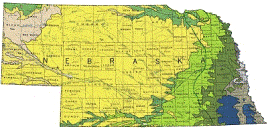United States Geological Survey

United States Geological Survey: Staff Publications
Document Type
Article
Date of this Version
2003
Citation
Quaternary Science Reviews 22 (2003) 135–140
Abstract
The Mono Lake excursion (MLE) is an important time marker that has been found in lake and marine sediments across much of the Northern Hemisphere. Dating of this event at its type locality, the Mono Basin of California, has yielded controversial results with the most recent effort concluding that the MLE may actually be the Laschamp excursion (Earth Planet. Sci. Lett. 197 (2002) 151). We show that a volcanic tephra (Ash #15) that occurs near the midpoint of the MLE has a date (not corrected for reservoir effect) of 28,620 ± 300 14C yr BP (~32,400 GISP2 yr BP) in the Pyramid Lake Basin of Nevada. Given the location of Ash #15 and the duration of the MLE in the Mono Basin, the event occurred between 31,500 and 33,300 GISP2 yr BP, an age range consistent with the position and age of the uppermost of two paleointensity minima in the NAPIS-75 stack that has been associated with the MLE (Philos. Trans. R. Soc. London Ser. A 358 (2000) 1009). The lower paleointensity minimum in the NAPIS-75 stackis considered to be the Laschamp excursion (Philos. Trans. R. Soc. London Ser. A 358 (2000) 1009).
Included in
Geology Commons, Oceanography and Atmospheric Sciences and Meteorology Commons, Other Earth Sciences Commons, Other Environmental Sciences Commons

